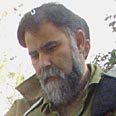
In the frontline of bereavement
We see them delivering 'El Male Rachamim' prayer at state ceremonies, but role of military cantors does not end there, as they accompany bereaved families all year long
According to the IDF's Personnel Directorate, a military cantor is an active duty soldier or career non-commissioned officer who serves in burial and memorial functions. However, there is a lot more to the role than is implied in the job description.
As religious representatives in such ceremonies, lending an ear or a warm shoulder to bereaved families is no less important than the more traditional duties of cantorship. Members of the Military Rabbinate are required to evince a great deal of sensitivity, patience and attention, always doing above and beyond the call of duty.
"At the age of 19 I already began conducting funerals, and it had a great effect on me," says retired Lieutenant-Colonel Chaim Weiner, who served as the chief military cantor until 2008. "It took me a few months just to immune myself of all the crying and weeping and constant confrontation with bereavement so I could function properly."
During the War of Attrition and the Yom Kippur War Wiener would find himself conducting as many as five funerals a day. At the time, as Central Command cantor he would also perform wedding ceremonies for career soldiers alongside the funerals. He will never forget holding the funeral of an officer just a month after conducting his wedding ceremony.
"No doubt relations with the families are formed over the years," he says. "Just a week ago I got a call from parents who lost a son and a daughter asking me to hold the memorial service this year too – after my discharge. I've heard several mothers saying 'my only comfort is that you are here'."
Wiener noted that he has formed close ties with 60 or 70 such family members.
Face of army and religion
Yossi Mark, a reserve military cantor who was previously in charge of assigning cantors in the Central Command said that the army provides a great deal of support for the bereaved families, with the cantors as the most prominent representatives.
"People think we say a prayer and go home, whereas in actual fact it's conducting a full memorial service, including special requests, which are the most important thing for the families," he said.
Mark noted that the IDF does its best to please the families, at times bending the rules slightly.
"We must be sensitive and attentive, to arrive well ahead of time in order to realize just how the ceremony will look," he said. "The religious families get on by themselves, those who require our services the most are those who see us as representatives of both the IDF and the Jewish religion."
Military cantors have two main obligations each year: To conduct main events at the military cemeteries on Israel's Fallen Soldiers Remembrance Day, and to hold private memorial services for the fallen soldiers of the Yom Kippur War on the days before and after the holiday of Sukkot.










